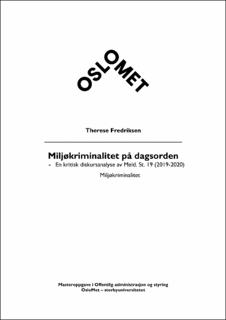| dc.description.abstract | The purpose in this Master Thesis has been to look upon how environmental crime is expressed in white paper no. 19 (2019-2020) Miljøkriminalitet. As a new reform, and the first reform about environmental crime that Norway hold, the reform will bring something new to the study. The white paper in its entirety has been reviewed, and text selections that are relevant to this thesis´ statement is presented in the chapter that hold the analysis.
The thesis statement How is the discourse on environmental crime expressed in white paper no. 19 (2019-2020) shall be examined through critical discourse analysis. There are several approaches of critical discourse analysis, but I have chosen to make use of Norman Fairclough´s approach. This approach works both as theory and method and is therefore a comprehensive solution. The particular reason for this circumstance made me merge this into one chapter. The white paper from The Norwegian Parliament is analyzed based on Fairclough´s model for critical discourse analysis that addresses three levels; analysis of text, discursive practice and social practice. Since there is no solution for how the layout should be in a critical discourse analysis, the textual analysis consists of word choices which is one of Fairclough´s headlines. This will be further looked into in chapter four.
As a part of the discursive practice, five discourses are identified according to the text that is presented in the chapter that deal with analyzing. The discourses that tells something about development and preventing when it comes to preventing environmental crime is called the development discourse and the prevention discourse. These discourses look at how the development on environmental crime is progressing, while in the prevention discourse, proposals and measures will be presented to reduce development. The work of abatement against environmental crime has led me to find the discourses surrounding competence and technology. The last discourse relates to transgressions of environmental crime, and this is called the discourse of violation. The identifies discourses are linked to the issue and helps to establish the expression of environmental crime. | en_US |
